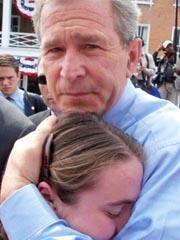Here is my original post from November 17. I re-dated it to move it to the top of the blog again. UPDATE: As we entered this past weekend, this valiant marine was still the topic of much debate. The cameraman's name has become prominent but the marine is still unknown to the public. May it ever be so--some heroes must remain unknown for their own good.
.
Last week in honor of Veteran’s Day, ABC aired Saving Private Ryan, the first Hollywood movie ever to cause me to grieve. It’s a film that earned is strong "viewer discretion" warning, but it's also one that should be seen by every American old enough to understand the words “freedom” and "cost." War, accurately portrayed, is hard on the eyes and harder on the stomach, but to the post WWII generations, Saving Private Ryan gives new meaning to five words:
Duty, Honor, Country... Thank you.
Duty, Honor, Country... Thank you.
Monday night and again tonight, I saw a similar film. It was shorter—not shot by Spielberg but by an NBC imbedded cameraman in Iraq. I hope you have not seen this footage, and I hope it soon fades into the fog of "news that isn't news." But if this story has legs, I fear that a young marine may be in trouble for actions that should never have been seen in our living rooms. Allow me to describe what I saw, taking a few liberties afforded a typical screenplay:
A handful of marines are seen crossing an iron bridge in Fallujah, Iraq. As they approach the road ahead, they look up at the empty black girders of the bridge. The frame freezes and dissolves into a Flashback of the same image—this time with two charred bodies of American contractors hanging overhead with a throng of laughing thugs dancing below, firing rifle shots in the air. The gun bursts snap us back to “real time” and our marines take cover at the foot of the empty bridge. They trace the fire to a nest of remnant insurgents about 100 yards away, hit it with a small missile, and all is quiet but the sounds of war in the distance.
As they move along the rubble, they meet up with part of the 3rd Battalion, 1st Regiment with an imbedded NBC cameraman. They exchange wary glances, and the newcomers are warned that the mosque they're approaching had been raining “AK-47 fire from Ala” down on them for two days, but it was finally put out of business yesterday just before the main wave of fighting moved north. As they cautiously advance, they give a wide birth to the strewn bodies of masked enemy soldiers along the road. The camera guy gets some shots of the carnage. “Don’t touch the bodies,” one grunt warns. “Some of them are booby trapped. One went off on our buddy yesterday. Killed him.” Another marine, whose face is still bloody from what looks like a bullet graze, adds, “And shoot anything that moves. Yesterday I nearly got my head blown off from one of these buggers who didn’t want to die alone.”
Suddenly, the boots stop at the base of a minaret, which the day before was illegally used as a machine-gun nest. They quietly enter the shattered sanctity of the mosque, camera rolling. The distant popping of gunfire fades. “It’s too quiet,” a voice whispers. Each trigger feels a tremulous finger, poised. Sunshine streaks in through high windows. The Marine’s eyes adjust to the light and each pulse quickens as the shapes of bodies on the floor emerge from the shadows. The marine with the wounded face cautiously steps toward one of them. The body is on its side; his hand is out of sight. Is he alive? Is he hiding something? “Why risk it again,” he thinks, remembering yesterday’s stinging blast to his face. And with little thought he fires a shot into the heap on the floor. Camera rolling. End of screenplay.
On the big screen, that scene in the mosque would run about 30 seconds, but unfortunately the incident was real, and the wounded marine who fired the gun may face criminal charges for shooting an unarmed “prisoner of war.” That’s the story. I don’t know every rule of the Geneva Accord; I don't know this marine (and hope that his name is never released). I don’t know every detail of this incident (though all but the dialogue and part about the infamous bridge is in the reports). But I do know this: that battle-weary marine was doing his job. Most soldiers in this unconventional war of human bombs and desperate terrorists would have done the same.
War should never be reduced to “reality TV.” There are no commercial breaks; no game-over buzzer at the end of each battle; no getting voted off the island. War is a mangle of man and machines where things blow up and people die. The horrific images should not be casually viewed and second-guessed from a living-room couch. I suggest a new rule for our military and our imbedded media:
.
Whenever an imbed's footage can help prove the facts of this war on terror—use the footage. But never should an imbedded camera be used to subject a fighting marine to criminal charges for pro-active self-defense in a time of war.
.
Soldiers live between frenzied snaps of time, and he who hesitates is lost.






